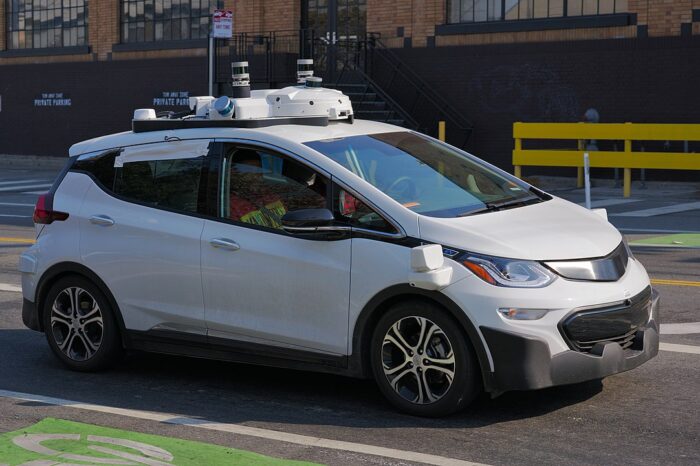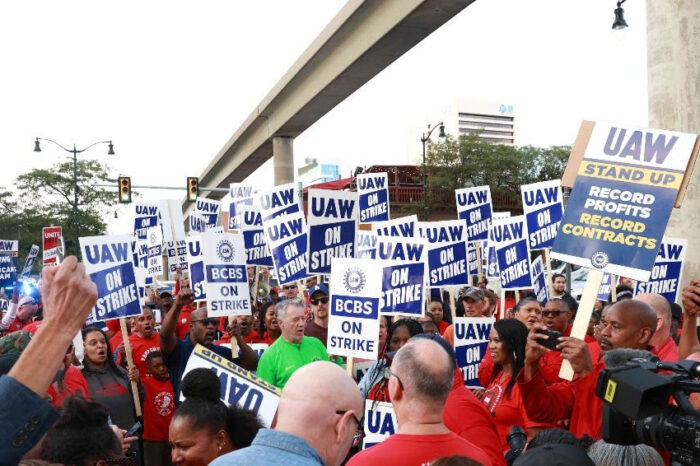A judge strikes down Prop 22, the law Uber and Lyft spent big to get passed in California – but the companies vow to appeal. Not a great couple of weeks for GM, forced to idle plants in response to a chip shortage and to recall all Chevy Bolts due to the risk of battery fires. Times are tense for Tesla as well: as federal regulators investigate its Autopilot system, two senators are calling for an investigation into the company’s marketing of its second driver assistance system: Full Self Driving. Ample, the battery-swapping startup, enjoys a very nice Series C round, while RepairSmith, which aims to an auto mechanic right to your doorstep, has a respectable Series B. The UK government is stepping up support for zero-emission technologies. It’s been a big week for Bird, now featured on Google Maps; it’s now about to start selling its own e-bike.
![]()
Judge strikes down Prop 22: A judge in California has ruled that Proposition 22, the ballot measure approved by state voters last year, is contrary to the state’s constitution and cannot be enforced. Uber, Lyft and other gig economy services spent over $200 million campaigning for the referendum, which classified gig workers as independent contractors rather than full employees. It looks like the companies are going to appeal the ruling — this is the U.S., after all.
Car makers slow down production: In response to the persistent shortage of microchips, major automakers are reducing production in the coming weeks. Toyota will reduce output by 40% in September, Ford is idling a plant near Kansas City and GM is stopping or reducing production at several of its factories around the U.S. for the next two weeks.
More bad news for Bolts: After recalling a subset of Chevy Bolts over concerns about batteries catching fire, the auto giant extends the recall to all Bolts and urges owners to park their cars outdoors and not leave them charging overnight in or near their homes. The Bolt recall will cost GM an estimated $1.8 billion. Ouch.
UK partners with BMW on batteries: BMW is one of four companies receiving funding from a government-funded initiative aimed at developing groundbreaking electric or hydrogen automotive technology. The BMW project, in line to receive $36 million, is focused on developing long-range batteries that will offer similar range to internal combustion engines. Other beneficiaries of Her Majesty’s largesse include Brunel, which is researching internal combustion engines fueled by hydrogen, and Celeritas, which is developing ultra fast-charging batteries.
Ample funding: Ample, the San Francisco battery-swapping startup, raises $160 million in a Series C round, bringing its total fundraising to $230 million. While others in the industry race to develop faster chargers and batteries with longer ranges, Ample is offering an alternative concept, where EV owners simply visit one of their charging pod locations and exchange their battery for one that is fully charged. In that way, charging your car could be just as quick as filling up a gas tank.
Home calls for mechanics: Los Angeles-based startup RepairSmith raises $42 million in a Series B round. The company, which is already operating in seven states, will send a mechanic to your doorstep to work on your car at home. Up to 90% of requested work, the company says, can be done at home. Who knew?
The Sino-Russian rail link: Seven years after breaking ground on the project, Russian and Chinese officials celebrated the completion of the Tongjiang-Nizhneleninskoye Bridge, a 7,300 foot bridge that links the two countries’ rail systems. The Chinese Communist Party has a stated goal of making it possible to travel all the way from Beijing to London by rail.
The EV machinery bonanza: As automakers pour billions into EV investment, the companies providing the manufacturing equipment are making a killing. Some say they cannot meet the demand.
A Texas-sized tax break: Fort Worth offers commercial EV maker Rivian $440 million in tax incentives to locate a planned factory in the North Texas city. In return, the company will have to hire 7,500 employees –– at an average salary of at least $56,000 –– by 2025.
Fancy an EV? Although the UK has set an ambitious goal of phasing out gas and diesel-fueled vehicles by 2030, Prime Minister Boris Johnson’s climate spokesperson, Allegra Stratton, says she doesn’t quite “fancy” an EV for herself, worrying that it wouldn’t be convenient for long drives to visit family in other parts of the country. As you can imagine, her comments were not universally well-received, with some EV proponents accusing her of spreading inaccurate information about EV range and charging capabilities.
![]() Senators ramp up pressure on Tesla: Days after the National Highway Traffic Safety Administration announced an investigation into crashes involving Tesla’s Autopilot system, two Democratic senators are calling on regulators to scrutinize the company’s newer AV software, Full Self Driving. In a letter to the Federal Trade Commission, Sens. Edward Markey of Massachusetts and Richard Blumenthal of Connecticut ask the agency to investigate whether the company has put consumers in danger by making them believe that Full Self Driving is capable of, well, full self-driving. As many experts have pointed out, the name is deeply misleading.
Senators ramp up pressure on Tesla: Days after the National Highway Traffic Safety Administration announced an investigation into crashes involving Tesla’s Autopilot system, two Democratic senators are calling on regulators to scrutinize the company’s newer AV software, Full Self Driving. In a letter to the Federal Trade Commission, Sens. Edward Markey of Massachusetts and Richard Blumenthal of Connecticut ask the agency to investigate whether the company has put consumers in danger by making them believe that Full Self Driving is capable of, well, full self-driving. As many experts have pointed out, the name is deeply misleading.
Through the eyes of a robo-taxi: In a blog post, Waymo offers a glimpse of what its Driver AI system sees as it navigates the narrow, bustling streets of San Francisco. The Alphabet subsidiary, which has been offering autonomous rides to the general public in certain parts of Phoenix since November, has now driven 20 million miles on public roads.
 Google Maps is for the Birds: Bird is the first micromobility operator to be integrated into Google Maps. In cities where the scooter-sharing business is operating, Google Maps will include scooters as a suggested transportation option, allowing users to see where Bird devices are located without separately consulting the Bird app. Will other micromobility operators quickly follow? If not, this could be a big edge for Bird over its competitors.
Google Maps is for the Birds: Bird is the first micromobility operator to be integrated into Google Maps. In cities where the scooter-sharing business is operating, Google Maps will include scooters as a suggested transportation option, allowing users to see where Bird devices are located without separately consulting the Bird app. Will other micromobility operators quickly follow? If not, this could be a big edge for Bird over its competitors.
Bird makes a bike: In other Bird news, the Santa Monica-based company has released a consumer e-bike, available at the mid-level price of $2,300. Why is it getting involved in bike sales? Bird may be hedging against the uncertainty of the unproven micromobility market by gaining a foothold in the rapidly-growing e-bike industry.
![]() An excerpt of The Brief History of Motion by Tom Standage tells the story of the first electric cars that emerged in the 1890’s and 1900’s –– and why they were ultimately pushed aside in favor of gas.
An excerpt of The Brief History of Motion by Tom Standage tells the story of the first electric cars that emerged in the 1890’s and 1900’s –– and why they were ultimately pushed aside in favor of gas.
Quartz takes a look at cities around the U.S. experimenting with free public transit.
Enjoy the Week in Review? Get it delivered directly to your inbox by signing up for the CoMotion>>NEWS newsletter.






